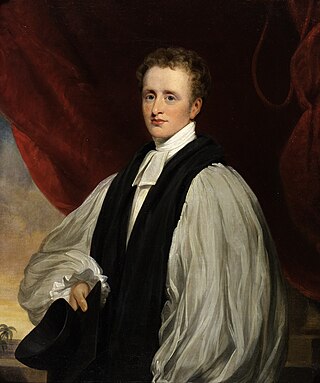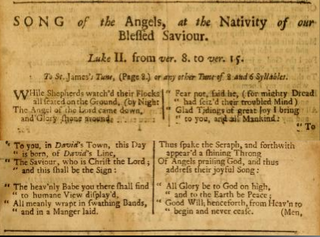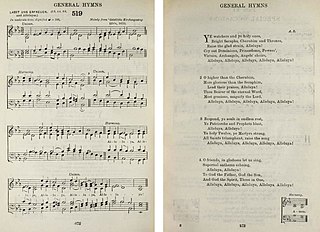A doxology is a short hymn of praises to God in various forms of Christian worship, often added to the end of canticles, psalms, and hymns. The tradition derives from a similar practice in the Jewish synagogue, where some version of the Kaddish serves to terminate each section of the service.
"Old 100th" or "Old Hundredth" is a hymn tune in long metre, from the second edition of the Genevan Psalter. It is one of the best known melodies in many occidental Christian musical traditions. The tune is usually attributed to the French composer Louis Bourgeois.

"For All the Saints" was written as a processional hymn by William Walsham How, who was ultimately the Anglican Bishop of Wakefield. The hymn was first printed in Hymns for Saints' Days, and Other Hymns, by Earl Nelson, 1864.

"Eternal Father, Strong to Save" is a British hymn traditionally associated with seafarers, particularly in the maritime armed services. Written in 1860, its author, William Whiting, was inspired by the dangers of the sea described in Psalm 107. It was popularised by the Royal Navy and the United States Navy in the late 19th century, and variations of it were soon adopted by many branches of the armed services in the United Kingdom and the United States. Services who have adapted the hymn include the Royal Marines, Royal Air Force, the British Army, the United States Coast Guard, United States Marine Corps and the United States Space Force, as well as the navies of many Commonwealth realms. Accordingly, it is known by many names, variously referred to as the Hymn of His Majesty's Armed Forces, the Royal Navy Hymn, the United States Navy Hymn, and sometimes by the last line of its first verse, "For Those in Peril on the Sea". The hymn has a long tradition in civilian maritime contexts as well, being regularly invoked by ship's chaplains and sung during services on ocean crossings.

"O Sacred Head, Now Wounded" is a Christian Passion hymn based on a Latin text written during the Middle Ages. Paul Gerhardt wrote a German version which is known by its incipit, "O Haupt voll Blut und Wunden".
"For the Beauty of the Earth" is a Christian hymn by Folliott S. Pierpoint (1835-1917).

"Holy, Holy, Holy! Lord God Almighty!" is a Christian hymn written by the Anglican bishop Reginald Heber (1783–1826).

"While shepherds watched their flocks" is a traditional Christmas carol describing the Annunciation to the Shepherds, with words attributed to Irish hymnist, lyricist and England's Poet Laureate Nahum Tate. It is listed as number 16898 in the Roud Folk Song Index.

"Ye Watchers and Ye Holy Ones" is a popular Christian hymn with text by Athelstan Riley, first published in the English Hymnal (1906). It is sung to the German tune Lasst uns erfreuen (1623). Its uplifting melody and repeated "Alleluias" make this a favourite Anglo-Catholic hymn during the Easter season, the Feast of All Saints, and other times of great rejoicing.

O filii et filiae is a Christian hymn celebrating Easter. It is attributed to Jean Tisserand, a Franciscan friar.

"Angels from the Realms of Glory" is a Christmas carol written by Scottish poet James Montgomery. It was first printed in the Sheffield Iris on Christmas Eve 1816, though it only began to be sung in churches after its 1825 reprinting in the Montgomery collection The Christian Psalmist and in the Religious Tract Society's The Christmas Box or New Year's Gift.

"The Hymn of Joy" is a poem written by Henry van Dyke in 1907 with the intention of musically setting it to the famous "Ode to Joy" melody of the final movement of Ludwig van Beethoven's final symphony, Symphony No. 9.

"All Glory, Laud and Honour" is an English translation by the Anglican clergyman John Mason Neale of the Latin hymn "Gloria, laus et honor", which was written by Theodulf of Orléans in 820. It is a Palm Sunday hymn, based on Matthew 21:1–11 and the occasion of Christ's triumphal entry into Jerusalem.

"Gelobt sei Gott im höchsten Thron" is a hymn for Easter in 20 stanzas in German by Michael Weiße, widely known with a later melody by Melchior Vulpius. Shortened, it is part of current Protestant and Catholic German hymnals.
"Crown Him with Many Crowns" is an 1851 hymn with lyrics written by Matthew Bridges and Godfrey Thring and sung to the tune 'Diademata' by Sir George Job Elvey. The hymn appears in many hymnals.

"O'er the Gloomy Hills of Darkness", also titled "O'er Those Gloomy Hills of Darkness", is a Welsh Christian hymn by William Williams Pantycelyn written in 1772. The hymn was written as a missionary hymn; there are conflicting accounts of why the hymn was written. The hymn was later published in 374 hymnals worldwide, though it was censored and altered in the United States by slaveholders for evangelising to slaves. The hymn later fell out of favour with hymn book editors in the 1960s.

"Allein Gott in der Höh sei Ehr" is an early Lutheran hymn, with text and melody attributed to Nikolaus Decius. With the reformers intending church service in German, it was intended as a German version of the Gloria part of the Latin mass, used in almost every service. Decius wrote three stanzas, probably in 1523, while a fourth was added, probably by Joachim Slüter.
Francis Pott was an English hymnwriter and Anglican priest. He is noted as the author or translator of a number of popular Christian hymns including "Angel Voices, Ever Singing" and "The Strife is O'er, the Battle Done". His hymns are an established part of the Anglican church music repertoire and commonly feature in hymnals such as The New English Hymnal.

Lucis Creator Optime is a 5th-century Latin Christian hymn variously attributed to St Gregory the Great or Saint Ambrose. It takes its title from its incipit.
















